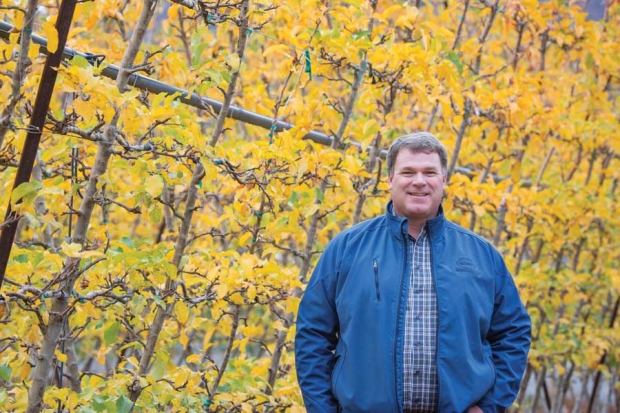
Del Feigal, president of orchard management of Auvil Fruit Company near Vantage, Washington, on November 19, 2015. Feigal was honored with the 2015 Silver Apple Award at the Washington State Tree Fruit Association 111th annual meeting. (TJ Mullinax/Good Fruit Grower)
To reach grower Del Feigal’s office, you travel on Interstate 90 until you reach the hamlet of Vantage, then head south down the Columbia River’s west bank until the county road ends.
There you’ll find one of the most interesting minds in the business, a Washington grower who is relentless about developing ideas to grow great fruit efficiently.
Feigal, 48, president of orchard management at Auvil Fruit Company, was selected to receive the 2015 Silver Apple Award, delivered last month at the Annual Meeting of the Washington State Tree Fruit Association.
For a man whose formal horticulture training consisted of two years at Wenatchee Valley College, Feigal has earned a considerable reputation as an orchardist whose experiments have led to growing practices adopted by others.
“Del has been very innovative in his pruning and cropping systems and in irrigation,” said Mike Robinson, general manager of Double Diamond Fruit in Quincy. “He’s continued the Auvil Company tradition of sharing what they know. I can drive around the industry and see bits and pieces and complete copies of what he does.”
Last year’s Good Fruit Grower magazine Growers of the Year, Mike and Craig O’Brien, cited Feigal as one of their resources.
Feigal appeared in this magazine in 2006 in an article on orchards of the future that dealt with his work to grow a consistent fruiting wall.
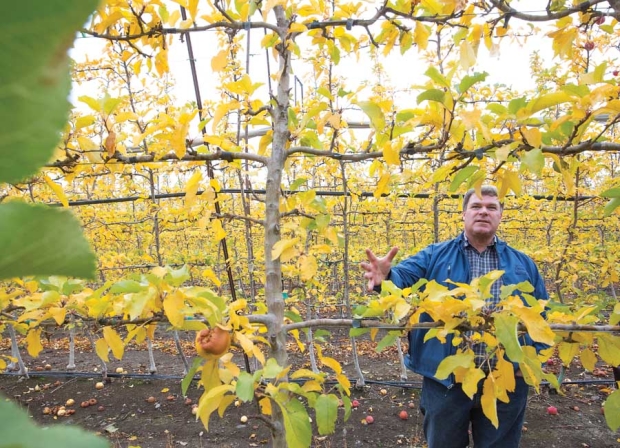
Feigal talks about a trellis system he installed. He has been managing orchards since high school, when his father gave him responsibility for
3 acres of Golden Delicious. (TJ Mullinax/Good Fruit Grower)
He planted apple trees 20 to 22 inches apart, trained to a modified Tatura trellis with 13 feet between rows and 3 to 4 feet between the tops of the canopies. His trellis was built with six to eight wires, about 18 inches apart, with the top wire at 12 feet high.
He trained one limb to each wire on either side of the tree trunk to create a consistent fruiting surface, tree to tree and row to row. His goal was 40 bins in the third leaf, and full production of 80 bins per acre from the fourth leaf onward.
Feigal wanted to build the canopy as fast as possible with high-quality fruiting wood, so that the main focus would be on using horticultural tools to grow high-quality fruit, rather than on growing vegetative wood and trying to get the trees to fill the space.
This shows an approach that others have followed.
“He knows what he wants to grow per acre, how many apples,” Robinson said. “He knows the maximum his trees will grow, and he translates that into how many apples per foot of limb. Then he thins and prunes to achieve that.”
Feigal has experimented with just about every major variable in growing, from computer-controlled irrigation systems to using platforms for harvest. Last February, he began something new: pumping heated water into soil to manage how trees emerge from dormancy.
The water is heated by on-demand propane heaters and pumped through standard irrigation pipes buried 8 to 12 inches to serve a 6-acre block. It’s a fascinating new idea, though Feigal said it’s too early to assess results.
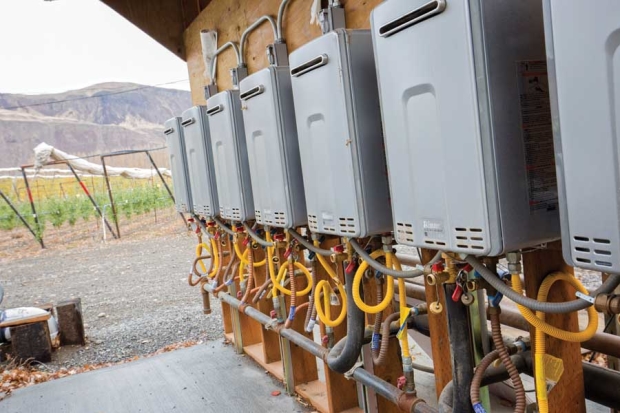
Del Feigal is experimenting with on-demand propane water heaters to artificially warm a 6-acre block of trees in late winter at Auvil Fruit Company near Vantage, Washington, on November 19, 2015. The heaters supply hot water to underground pipes beneath the apple trees in the distance. (TJ Mullinax/Good Fruit Grower)
Feigal began managing orchards in high school, when his father gave him responsibility for 3 acres of Golden Delicious. Feigal took to it immediately. He liked the variety of orchard work.
He liked the outdoors. After his graduation in 1985 from Eastmont High School in East Wenatchee, it was a natural choice to enroll in the horticulture program at Wenatchee Valley College, which led to jobs managing orchard operations, a stint as a consultant with G.S. Long, and then Auvil. Feigal became Auvil’s president of orchard management in 2014.
In that role, he oversees close to 2,000 acres of fruit. At two main locations in Orondo and Vantage, the company grows Aurora Golden Gala, Braeburn, Cripps Pink, Fuji, Gala, Granny Smith and Honeycrisp apples and Rainier, Bing and Lapin cherries.
Feigal sees himself as continuing the tradition set by the legendary Grady Auvil, the Washingtonian who pioneered the Granny Smith, Gala and Fuji apples.
Grady Auvil, who passed away in 1998 at age 92, was celebrated for his willingness to share knowledge with other growers. “Grady enjoyed growing fruit, and he liked to see others enjoying doing it, too,” said Feigal.
Grady Auvil was a pioneer in trellises. Feigal continues to experiment with trellises, tweaking different elements to achieve maximum tonnage per acre with the best quality.
Feigal often carries black tape in his pocket to guide limbs along wire.
His goal is to design the best trellis system and then, with precision pruning, replicate it across an orchard so the benefits of uniformity extend from flower to harvest, with limbs producing fruit in predictable numbers and location so picking is efficient.
Each apple variety comes with a specific goal of tonnage per acre; all effort serves that goal.
Robinson provides an insight into how Feigal thinks.
“Del is not horribly interested in what other people want or think about their trees,” said Robinson. “He will look at the tree and think, ‘What if I do this? I’ve seen how a tree responds, so I’ll try this.’ He’s willing to look at a tree and think about it. It’s surprising how few people in the industry think about it. Most people are more interested in replicating somebody else’s system. Del is way more interested in maximizing his system.”
Like innovators in any industry, Feigal is relentless about trying new things.
He doesn’t seem satisfied with the status quo. Great horticulture is certainly a complex activity, yet Feigal’s underlying philosophy is simple.
“Pay attention to how the trees perform,” he said. “I learn more from the trees than from any textbook.” •
by O. Casey Corr

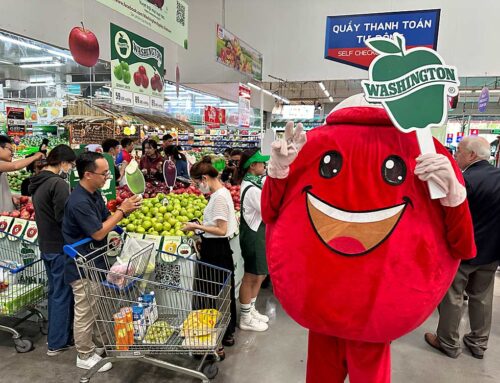
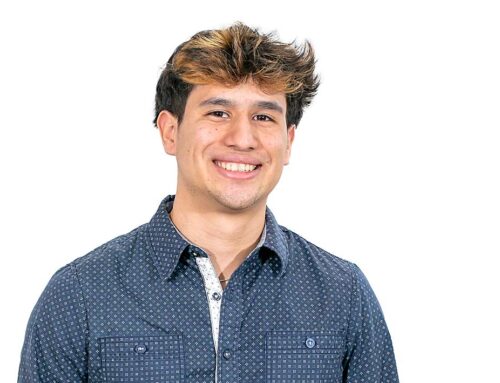
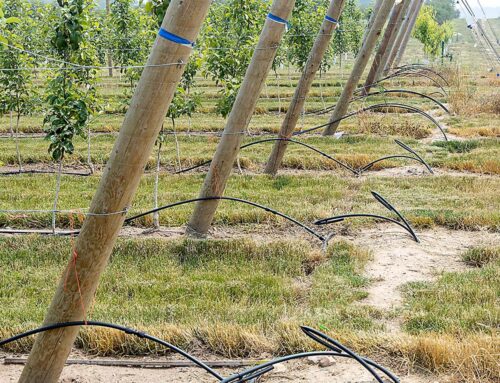
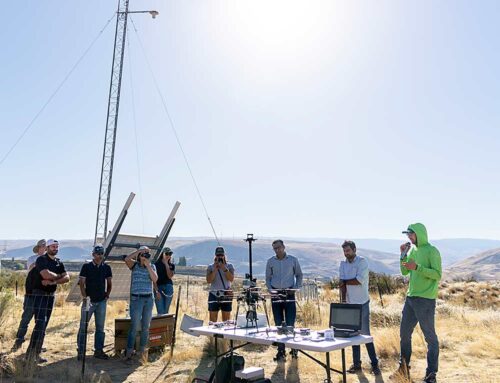
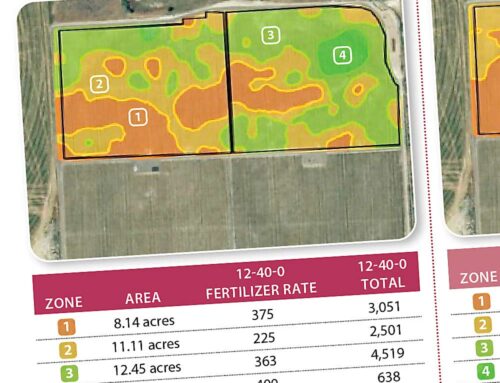
Leave A Comment